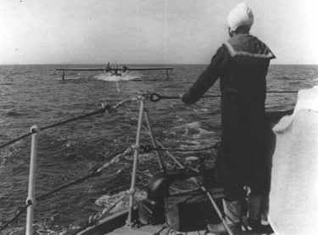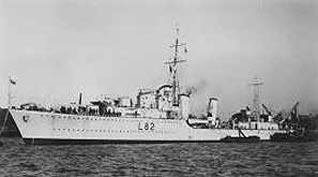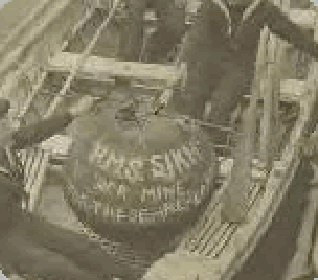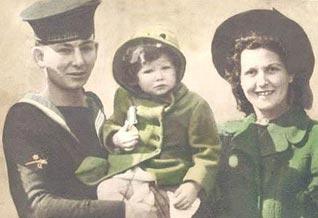
Above: a Sikh sailor aboard the H.M.S. Sikh. Below, first from bottom: Arthur Collins, wife Elizabeth and three-year-old daughter Marion.



History
A Ship Called Sikh
THE TELEGRAPH
| Class and type: | Tribal-class destroyer |
| Displacement: | 1,870 long tons (1,900 t) |
| Length: | 364 ft 8 in (111.15 m) |
| Beam: | 36 ft 6 in (11.13 m) |
| Draught: | 13 ft (4.0 m) |
| Propulsion: | 2 × Parsons geared steam turbines 3 × Admiralty 3-drum boilers rated at 300 psi 2 × shafts |
| Complement: | 190 |
| Armament: | 8 × 4.7 in (120 mm) dual purpose guns (4x2), 4 × 2-pounder anti-aircraft guns (1x4), 8 × .50 in (13 mm) anti-aircraft machine guns (2x4), 4 × 21 in (530 mm) torpedo tubes (1x4; Mk. IX torpedoes), 2 × depth charge throwers, 1 × depth charge rail |
The North African port, captured from the British by the Germans the previous June (1941), was crucial to supplying Rommel's forces for the anticipated Battle of El Alamein, and Churchill had ordered its destruction.
Able Seaman Arthur Collins was a gunner aboard H.M.S. Sikh which, with another Tribal class destroyer, H.M.S. Zulu, landed a large force of Marines and other units. In the course of a few hours, several key harbour installations were demolished. But under remorseless shelling from German and Italian shore batteries, H.M.S. Sikh sank with considerable loss of life.
The raid ended in a rout, and Collins was posted missing, presumed dead. After receiving a telegram to this effect from the Admiralty, his wife Elizabeth started drawing a widow's pension, but some two months later a second telegram brought news that he had been found safe and well in Malta.
Shocked and shaking, Collins eventually turned up unannounced at his home in Edmonton, north London (United Kingdom), still covered in oil and wearing only a Navy undervest and trousers. He was later summoned by the Admiralty to give evidence at a secret board of inquiry into the sinking of H.M.S. Sikh, and the BBC broadcast a 30-minute radio feature about his remarkable ordeal.
Arthur King Collins was born on July 20, 1920 at Arbroath, one of four children. He took his middle name from a friend of his father's who had been killed fighting alongside Collins senior in the trenches during the First World War.
On leaving St Mary's School, Hamilton, at the age of 14, Arthur worked at a bolt manufacturers until his parents moved to Edmonton. He took various jobs until he volunteered for the Royal Navy in 1939.
In September 1942, he was serving aboard Sikh when she joined the ill-starred mission to retake and destroy Tobruk - codenamed Operation Agreement. It was a bold venture: a party of 80 commandos would drive into the port disguised as prisoners-of-war under German guard and capture a bridgehead just outside the harbour under cover of the biggest air raid ever seen on the north African coast.
The omens were not good. H.M.S. Sikh, under the command of Captain St John Micklethwait, was not designed to land troops, and practice landings off the coast of Cyprus had been near-farcical. On her deck, two whalers had been replaced by six dumb lighters, flat-bottomed landing craft knocked up out of plywood sheets nailed together by Arab workmen which in the event proved unseaworthy. Moreover, there was a suspicion among the commanders of Operation Agreement that the enemy already knew of the planned raid.
On Sunday, September 13, a force of 360 marines and 22 officers embarked aboard H.M.S. Sikh and H.M.S. Zulu. At 0500 the next morning, a searchlight held Sikh in its beam and she was bombarded from the shore. Sikh's and Zulu's gunners returned fire, Collins being a member of Sikh's "A" gun battery, but at 0526 Sikh was hit by a huge shell which started a fire and hit some ammunition which exploded, killing several marines.
The crippled ship could only turn slowly in circles, halting when the engines stopped. Zulu made several attempts to take her in tow, eventually succeeding, only for the hawser to snap when a shell landed on her quarterdeck.
Forced to retire, Zulu turned seawards, leaving Sikh ablaze fore and aft. Micklethwait gave the order to abandon ship. Although injured himself, Collins helped badly wounded men to get clear and had to push several Marines - who were so badly hurt that they could not jump - into the water. Collins followed, grabbing some paddles to keep afloat before scrambling into a net raft.
For three hours the enemy continued to rain shells on the stricken Sikh, some falling short among the men in the water, many of whom were killed or wounded. Collins was picked up by an enemy rescue vessel and taken to a dressing station, given first aid by the Germans and taken away by lorry with other wounded.
Collins found himself in a "disgustingly dirty" Italian tent hospital and waited 36 hours before his wounds were attended to. After spending a week in a transit camp, he was taken to a prison camp in Benghazi where some 6,000 British PoWs were herded into a pen. For 10 days he was able to watch RAF raids on the harbour "and had a front seat view of ships burning and blowing up". He also witnessed a fellow prisoner being shot and bayoneted while trying to escape.
Weak from starvation and dysentery, Collins was eventually moved again, this time to Tripoli, a journey by lorry that took four days. There the food was slightly better, but at short notice he was moved a fourth time, and embarked on the freighter Sicilian: 830 PoWs were crammed in her hold; there was no room to sit and the hatches were battened down, leaving only a small gap for light and air.
Using his signet ring, a gift from his mother, Collins bribed an Italian cook to allow him to remain in the ship's galley rather than return below, striking a deal that almost certainly saved his life. Two days out of Tripoli, on the night of November 14-15, the freighter was shelled and then torpedoed by the British submarine Sahib.
He was unsure how he ended up in the water but believed he performed an assisted dive, the ship rearing under him with the force of the explosion. Breaking the surface, he found the vessel had almost disappeared. Only one other British sailor got out of the hold alive, and Collins could see no more than 100 other men in the water. He and the other rating were eventually picked up by a British ship and landed on Malta.
The following year Collins was one of 12 officers and men from Sikh to be decorated following the abortive raid, receiving the Distinguished Service Medal.
After the war Collins was employed as a general craftsman until he was recalled for duties in the Korean War and later the Suez crisis. After his final discharge he worked as a steel erector for Southern Gas. Later he worked for several years as a stoker at Enfield rolling mills. He finally retired in 1985.
Collins was a standard bearer for the Edmonton branch of the Royal British Legion until ill-health forced him to give up, and he spent the last 10 years of his life in a nursing home.
Arthur Collins, who died on August 6, 2010, married, in 1939, Elizabeth Clifford. She and seven children survive him; one of his daughters predeceased him.
August 28, 2010
Conversation about this article
1: Ari Singh (Burgas, Bulgaria), August 28, 2010, 4:31 PM.
Indeed, an interesting article.I wish sikhchic.com could create a navigational button marked "Sikhs in the Wars" so that one can easily locate the material for our children, friends, etc.
2: Hardeep Singh (United Kingdom), August 30, 2010, 9:44 AM.
A fantastic read - this ship will feature in our next film. And you can find out more about Sikhs at war here: www.sikhsatwar.info
3: Anthony Wright (St. Albans, United Kingdom), January 17, 2011, 10:11 AM.
My father Corporal George James Wright was one of the Marines on HMS Sikh on that fateful night. Every thing Arthur Collins has said is true to his word. My father was one of the marines to be thrown into the water by the seamen to give him some hope on that night. It saved his life as he was badly burned and the warm Mediterranean salt water was healing to his wounds. He was picked up by Rommel's German troops. The first questions they asked him was why were you late, they knew they were on their way. Dad was taken as POW and sent to Tripoli where he spent 6 months before being repatriated back home as the Italians could not look after them and food was very scarce. Dad was 20 yrs old at the time and sadly passed away on July 13th, 2010, only weeks before Arthur did. They only lived some 15 miles from each other. If only the pair of them knew that: what a great reunion they could have had! I was proud to wear Dad's medals at last year's Remembrance Day parade in St Albans. God Bless Arthur and Dad.
4: Jeni Wolfe-Wilson (New Zealand), March 16, 2011, 4:56 AM.
My grandfather, Charles (Charlie) Key, was also on the 'Sikh' as a stoker and was a POW. After being 'missing' for several years, he was repatriated back to England in ill health, wrapped in 2 camel-hair bankets. He went into the merchant navy, but I have no details. He never spoke very much of his experience to his family, except to his son, my late father. I have his two camel-hair blankets. Hearing details of the battle and POW experiences makes me feel a little closer to what he went through. Thank you. I am still searching for his details but have had little success.
5: Alan Brock (Essex, United Kingdom), November 17, 2011, 12:05 PM.
My Dad, Joe Brock, was an able seaman on board the "Sikh: on that fateful day. He was taken prisoner to Tripoli. He lived a long and happy life and passed away in 1989.
6: Gary Cootes (Loughton, Essex, United Kingdom), March 07, 2012, 3:31 PM.
My grandfather was on "HMS Sikh" and was captured in the raid. Strange, isn't it, that he and Collins did not live far from each other. He told my father of his experiences when he was a Prisoner of War and how badly they were treated by the Italians. About 18 months after the capture, they were sent home in a unique prisoner 'swap' and he served on landing craft on D-Day.
7: Nikita Dhillon (Pinner, London, United Kingdom), October 29, 2012, 2:30 PM.
My friend Maya had a grandfather who was on "HMS Sikh" and was close with the crew. He used to always tell her dad about what they saw, did and all of their experiences. Most of them got badly injured but luckily her grandfather wasn't injured that badly! When they were sent home they threw a big party and congratulated him. God bless him and the other noble people that helped out, may they rest in peace.
8: Karen Dorrell (Australia), January 07, 2016, 8:47 AM.
I have a diary entry in my grandfather's War Diary written by a L J Jones, ERA, HMS Sikh, who was also aboard that fateful night. Account reads much the same as well. Would love to hear from anyone who was related to Jones as it would be an honour to share his writings with them.
9: Mike Trowbridge (Denham (Sharks Bay), Western Australia), August 03, 2016, 9:12 AM.
My wife's father, R A (Freddy) Bartholomew, was there that night. He was 18. He was prisoner-exchanged after 18 months. He married Martha Strawbridge on August 15, 1945. Their 71st anniversary is next week. He is 94 this year. Still going strong ... driving. He brought his family to Western Australia in 1953.
10: Rollo Snook (Bristol, United Kingdom), August 14, 2016, 7:14 PM.
My father's uncle James Wilson was a Glaswegian sailor on HMS SIKH from the beginning. He was one of the prisoners repatriated in time for D-Day. The Sikh hunted the Graf Spee, fired torpedoes at the Bismarck, escorted Russian convoys, watched the Ark Royal sink, escorted Malta convoys and much more.
11: Tom Jenkins (Livingston, Scotland), March 09, 2017, 4:43 PM.
Walter Nathaniel from the HMS SIKH came from my village, Pumpherston, in West Lothian and we are hoping to erect a stone cairn as a memorial to commemorate the young men from the village who, like Walter, paid the supreme sacrifice. He is buried in the Tobruk cemetery.
12: Angela Hinchliffe (Hyde, United Kingdom), August 19, 2017, 3:06 PM.
My grandfather Richard Brandwood was on the 'Sikh'. Unfortunately he was one of the ones who didn't make it. I have only just found out about it. I would love to know more. He was Chief Stoker.
13: Matthew Stevens (Canterbury, Britain), September 29, 2017, 8:28 PM.
My great grandfather Charles Jennings was aboard HMS SIKH. He is still here with us at the age of 98, and only a month ago he was telling my girlfriend all the stories word for word from when I first remember hearing them at a very young age. The ship was blown up and he tread water for a whole day until Germans picked him up and handed him over to the Italians. The food was barley, enough for the amount of men needing food. I read somewhere they were well looked after, maybe compared to some atrocities going on at that time but can assure he came back skin and bones. My great Nan was under the impression he had been killed and even read in the local Canterbury Gazette saying he was missing at sea. It's still at his house, that cutting from the paper. He was in the engine room. He lost his best friend that day the ship blew up and he thought it was the end for him too. Glad I found this page.
14: Barry Gates (England), February 01, 2018, 8:50 AM.
My father Percy Gates served on HMS Sikh from 25 April, 1938 until it went down on that night in September 1942. He had progressed up through the ranks as a Signalman. He survived by diving in the water and was picked up by the Germans and taken to a POW camp in Southern Italy. He was repatriated after six months back to Chatham where he served on mine sweepers on the Thames and then on HMS Bellona, assisting the Normandy landings. Unfortunately he and my mother split up after the war, so I never heard any of this first hand. He died in 1972 at the age of 56. But I later inherited several mementos of that boat and its history.


